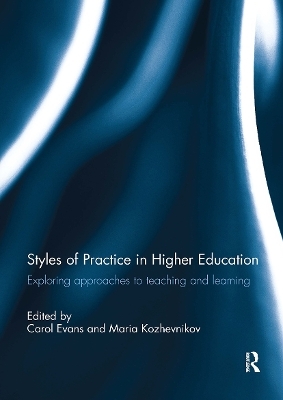
Styles of Practice in Higher Education
Routledge (Verlag)
978-1-032-93036-7 (ISBN)
This book was originally publis
This book highlights important discussions occurring within the styles field that have direct relevance for the development of effective twenty-first century learning environments. Styles research in this context is used as an umbrella term to encompass cognitive styles, learning styles, and approaches to learning, as well as student and teacher beliefs and conceptions of learning and teaching. Styles have the capacity to influence instruction in the ways that an educator chooses to design and deliver the curriculum. However, the potential of styles to inform teaching and learning, and vice-versa remains under-explored. Furthermore, the frequent misuse and misinterpretation of styles has led to over simplistic assumptions and practices including the labelling of learners as one style or another and the focus on matching mode of instruction to style of learner. A fundamental challenge, therefore, remains the dissemination of clear guidance on the effective ways of using styles research in practice; this is the core aim of the Education, Learning, Styles, Individual differences Network, whose members have contributed chapters to this book.
The volume provides a major contribution to the knowledge base on enhancing the application of styles research to practice within both educational and workplace settings and is of considerable value to those involved in the design and delivery of effective learning environments within higher education. Relationships between styles variables and other individual learning differences are considered across a range of subject domains (medicine, science, teacher education) and cultural contexts. The key themes discussed include the potential of constructivist environments to effect change in learning behaviours; the notion of deep approaches to learning; relationships between approaches to learning and self-regulated learning; the varied learning and teaching responses of students/teachers to specific constructivist interventions including the identification of specific patterns of responses that are characteristic of highlighted groups; relationships between conceptions and approaches to learning and teaching
This book was originally published as a special issue of Research Papers in Education.
Carol Evans is an Associate Professor and Head of Teacher Education at the Graduate School of Education in the College of Social Sciences and International Studies, University of Exeter, UK; a Visiting Fellow at the Institute of Education, University of London, UK; and President of the Education, Learning, Styles, Individual differences Network. She has previously been Assistant Director of Learning and Teaching (ITE) at the Institute of Education, University of London, UK, and development and co-ordination of the Masters PGCE programme at Durham University, UK. She has also worked as an Educational Adviser to Medical Consultants and has spent over 22 years in a variety of roles from classroom teacher to senior manager in schools. Her research interests include improving conditions for learning, cognitive and learning styles and assessment and feedback practice. Maria Kozhevnikov is Associate Professor of Psychology in the Department of Psychology at the National University of Singapore, Visiting Associate Professor of Radiology at Harvard Medical School, Athinoula A. Martinos Center for Biomedical Imaging, Department of Radiology, USA, and also Associate in Neuroscience at Massachusetts General Hospital. She received her PhD from Technion, Israel, jointly with UC Santa Barbara. Since 2001, she has held faculty positions at Rutgers and George Mason Universities in the USA. During 2005-2007, she served as a Program Director for the Science of Learning Centers Program at the US National Science Foundation, where she managed awards for large-scale Centers that study learning across multiple disciplines.
1. Styles of practice: how learning is affected by students’ and teachers’ perceptions and beliefs, conceptions and approaches to learning 2. The interplay between students’ perceptions of context and approaches to learning 3. Exploring students’ perceptions of feedback in relation to cognitive styles and culture 4. Why is my design not working? The role of student factors 5. Teacher educators’ conceptions of learning to teach and related teaching strategies 6. The relationship between teaching and learning conceptions, preferred teaching approaches and questioning practices 7. Knowledge construction: the role of the teacher’s interpersonal attitudes
| Erscheinungsdatum | 16.10.2024 |
|---|---|
| Verlagsort | London |
| Sprache | englisch |
| Maße | 174 x 246 mm |
| Gewicht | 276 g |
| Themenwelt | Sozialwissenschaften ► Pädagogik ► Allgemeines / Lexika |
| Sozialwissenschaften ► Pädagogik ► Bildungstheorie | |
| Sozialwissenschaften ► Pädagogik ► Erwachsenenbildung | |
| ISBN-10 | 1-032-93036-5 / 1032930365 |
| ISBN-13 | 978-1-032-93036-7 / 9781032930367 |
| Zustand | Neuware |
| Informationen gemäß Produktsicherheitsverordnung (GPSR) | |
| Haben Sie eine Frage zum Produkt? |
aus dem Bereich


